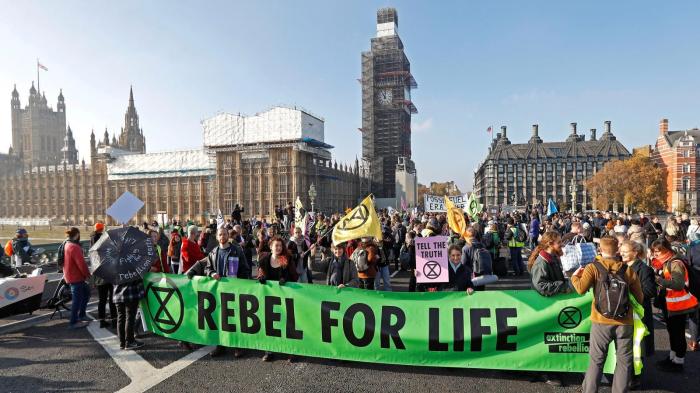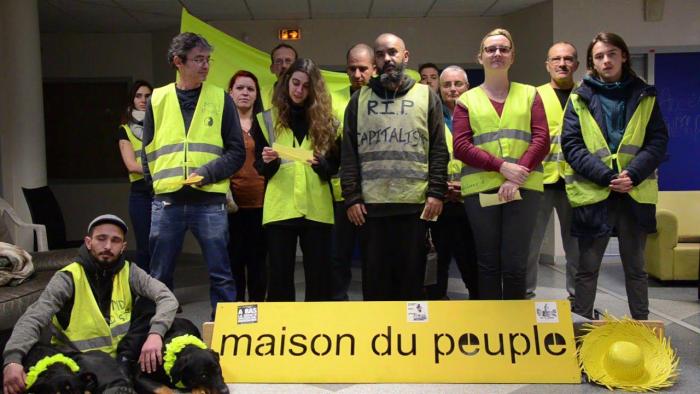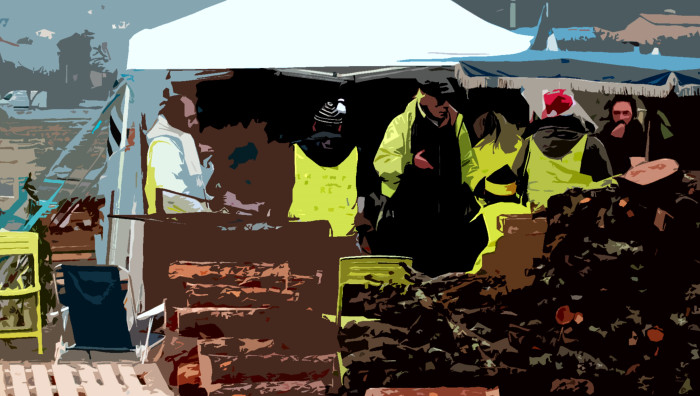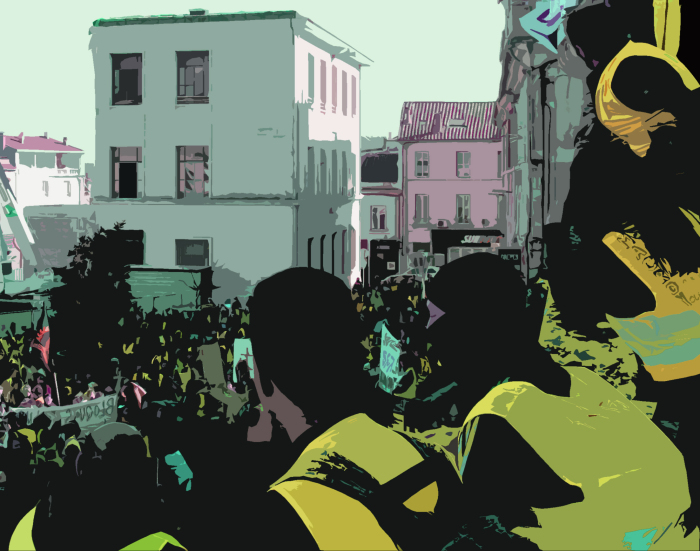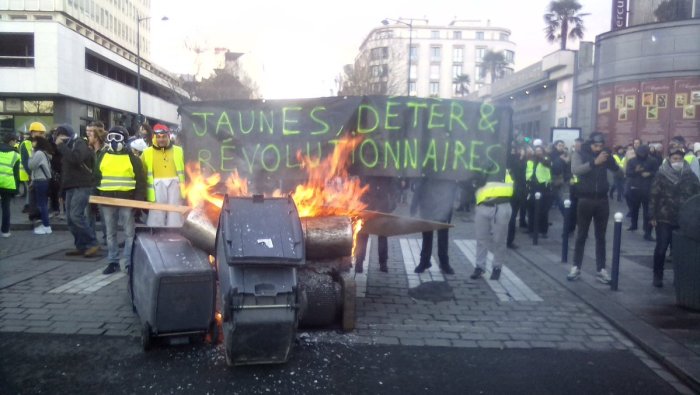
Number 49
In this issue:
- Deepening our resistance
- Why I decided to fight: letter from a Yellow Vest prisoner
- Julian Assange: enemy of the empire
- The modern leftist
- Rudolf Rocker: an orgrad inspiration
- Acorninfo
Synchronicity has a funny way of throwing together two apparently unrelated events in a way that invites comparison.
This was the case, for instance, with Saturday November 17 2018, the day on which both the Gilets Jaunes in France and Extinction Rebellion (XR) in the UK were launched onto their respective national stages.
Initially, the comparison appeared to favour XR, from our perspective at least. In Britain, altruistic environmentally-aware protesters were battling to save the planet, while across the Channel the Yellow Vests were upset about a rise in petrol prices.
But that perception rapidly changed.
The Gilets Jaunes, attacked by the police, smeared by the corporate media, despised by government and business elites, clearly represent a serious and genuine radical challenge to the existing order (see our Gilets Jaunes page).
XR, big pals with the police, frequently feted by the corporate media, adored by a significant part of the government and business elites, are clearly seriously compromised by their close connections with the existing order (see our Climate Capitalists page).
We saw another synchronicity in the fact that the new organic radicalism project (see Acorn 48 and orgrad.wordpress.com) was unveiled at the same time as the latest XR happening and all the controversy surrounding it.
Again, at first sight the comparison might seem favourable to the climate protesters. One small group of people present a political ideology or philosophy built on wisdom accumulated over many decades, centuries and even millennia. But it’s all just words, which modern people are too busy to read.
Another, much larger, group actually does something. It takes to the streets, blocks one of the world’s great capital cities for days on end, draws everyone’s attention to climate change, miraculously forces the British parliament to declare a “climate emergency”.
But, in fact, close scrutiny of XR and the climate movement as a whole suggests that all this rebellious energy is in danger of being channelled into a cunning ploy to relaunch capitalism.
The plan is to use a “Green New Deal” and a “New Deal for Nature” to spark a “Fourth Industrial Revolution” which will make a lot of people very rich, including the venture capitalists who have voiced support for XR.
Obviously the people involved on the ground in the XR London protests were not willingly part of a capitalist plot. Obviously they are not stupid and many must have been aware of the danger of their struggle being co-opted. Hopefully many of them will break free from the “leadership” and organise autonomously and radically.
But there is a major problem behind this wave of environmental protest which goes beyond the detail of the signatories of the XR Business letter to The Times or the corporate links to the climate campaigns set out with painstaking detail by investigative journalist Cory Morningstar.
The problem is with the use of the term “climate” as the cornerstone of the movement.
We are not saying that climate change is not real and dangerous but it is by no means all that is really dangerous about industrial capitalism.
What about extractivism in general, not just for fossil fuels? What about pesticides? What about nanoparticles? What about all the rest of the pollution, contamination and destruction that forms part of this nightmare industrial age?

It won’t disappear with the measures being proposed to deal with climate change. All that hi-tech carbon capture technology, all those solar panels covering the world’s deserts, all those wind turbines cluttering our coastlines, will still need to be manufactured in polluting factories, using raw materials mined out of the flesh of Mother Earth.
Fighting under the banner of “the climate” is a severe weakness for the environmental movement because it means the issue can be picked off, channelled and neutralised.
If “the climate” is the problem, then capitalism is on hand to sell us the solution.
The money-orientated approach is always about superficial responses. If you have got a cold, a drugs company will sell you a product to suppress the symptoms. But you will still have a cold and it will probably last three times as long because your body will be prevented from expelling toxins in the way it knows best.
If environmentalists place climate issues within the larger context of what our culture has become, then the capitalists can have no quick-fix solution to sell us. There is no sales opportunity for them. They cannot latch on to a movement which aims to see their empire of greed and profit taken down.
The narrow fixation with “climate” on the current environmental scene is part of a larger issue, namely that of fragmented thinking.
It is here that the relevance of organic radicalism comes in. Again and again, the thinkers who inspired this philosophy condemned the modern tendency towards fragmented thought.
The same point is made in different ways by the likes of neurologist and psychiatrist Kurt Goldstein, psychologist Max Wertheimer, philosopher Alan Watts, anti-industrialist writer Theodore Roszak and editor Satish Kumar.
Indeed Kumar has specifically mentioned “climate” in this context, saying: “I am constantly reminding people to think holistically, think in a bigger way, a spiritual way, rather than get stuck in this one idea that climate change is the problem, or this or that is the problem. Our problems are interrelated”.
He adds: “The actions of environmentalists will lead to tears if they don’t come from the place of the spirit. Their activism can end up in nuclear power or genetic engineering or the whole countryside covered with windmills or solar panels and no trees left anywhere”.

Fragmentation is a problem which goes to the heart of the failure of our civilization. We have lost sight of the holistic unity of things and see only unconnected separate items forming no coherent pattern. We don’t see a wood, just trees. There is no such thing as society, only individuals. The idea that humankind is part of nature is regarded as a naive fantasy.
On the political level, once we start fragmenting our understanding into separate issues, we cut those issues off from the whole of which they are part.
Racism and sexism, for instance, can only really be understood within a wider context of our relationship to “the other”, of complex patterns of projection, power and domination.

An organic radical perspective insists on the unity of the human species as an organic entity, and on humankind’s belonging to the living world and the cosmos beyond.
It challenges the individualism, the subjectivism, the “me first”, the “I think therefore I am”, that underpins our whole modern culture.
Fragmented thinking just talks about racism or sexism as separate issues. And, lo and behold, in isolation they can easily be “solved” (in fact, hidden from view!) by the system.
“Racism is over – here’s a black president! Sexism is over – look how many CEOs of rapacious capitalist corporations are now women!”
“You say CO2 is the problem? We have just the machine you need? Can’t afford it? You’d better declare a climate emergency and raid the public piggy bank to buy it from us!”
Organic radicalism is an attempt to counter fragmented thinking in anti-capitalist and environmental circles.
It is an attempt to give our movements real philosophical roots, to make them strong and alive.
The name given to this deeper understanding is not important, of course. It has appeared in many forms throughout history and will do so again.
Whatever we choose to call it, we badly need this ancient and powerful wisdom to guide us away from traps and dead-ends and to steer us into the free and healthy future for which we yearn.

2. Why I decided to fight: letter from a Yellow Vest prisoner
Thomas P is just one of many Gilets Jaunes prisoners in France, locked up for their participation in the mass uprising against the neoliberal Macron regime. Below are some excerpts from an open letter he wrote from jail, after three months behind bars.
One is no longer innocent when one has seen ‘legitimate’ violence, legal violence: that of the police.
I saw the hatred or emptiness in their eyes and I heard their chilling warnings: ‘disperse, go home’.
I saw the charges, grenades, and beatings in general.
I saw the checks, searches, traps, arrests, and jail.
I saw people falling, blood, I saw the mutilated.
Like all those who were demonstrating this February 9th, I learned that once again a man had just had his hand ripped off by a grenade.
And then I did not see anything any more, because of the gas. All of us were suffocating.
That’s when I decided not to be a victim any more and to fight.
I’m proud of it. Proud to have raised my head, proud not to have given in to fear.
Of course, like all those who are targeted by the repression against the Yellow Vests movement, I first protested peacefully and daily, I always solved problems with words rather than with fists.
But I am convinced that in some situations conflict is needed.
Because debate, however ‘big’ it may be, can sometimes be rigged or distorted. All that is needed is for the organiser to ask the questions in a way that suits them.
We are told on one side that the state coffers are empty, but we are bailing out the banks with millions when they are in trouble, we are talking about an ‘ecological transition’ without ever calling into question the production system and consumption at the origin of all climatic disturbances.
We are millions who shout at them, saying that their system is rotten, and they are telling us how they are trying to save it.
The challenge of street clashes is to manage to push back the police, to keep them in line: to get out of a trap, to reach a place of power, or to simply take the street.
Since November 17th those who have threatened to fire their weapons, those who brutalise, mutilate, and suffocate unarmed and defenceless protesters, those who are not the so-called ‘breakers’, they are the police.
If the media does not talk about it, the hundreds of thousands of people who have been at the roundabouts and in the streets know it.
Behind their brutality and threats, it is fear that is hiding.
And when that moment comes, in general, it means that the revolution is not far away.
Read the full English translation of the letter here.
3. Julian Assange: an enemy of the empire
Rarely has the arrogant imperialism of the USA been so blatantly exposed as by the case of Julian Assange.
On Monday May 13 Swedish authorities announced, bizarrely, that they were reopening the long-dropped “rape” investigation against the Wikileaks founder.
Assange’s lawyer Per E Samuelson told Swedish TV the decision to reopen the investigation was “an embarrassment”, while WikiLeaks editor-in-chief Kristinn Hrafnsson said it would give Assange a chance to clear his name.
Assange is also still facing the extraordinary prospect of extradiction and trial in the US, despite not being American and not being alleged to having committed any offence on US soil.
The “world’s policeman” apparently has the right to punish anyone, anywhere in the world, who it considers its enemy, and supine vassal states like the UK are only too eager to go along with this.
The twist in the Assange case is that the “crime” he is said to have committed is precisely to have exposed, through Wikileaks, the arrogant imperialism of which he is now a victim.
Having been illegally dragged out of the Ecuadorian embassy with the UK political police, he is being treated with all the justice that might have been afforded a political dissident in Stalin’s USSR.
As historian Mark Curtis has pointed out, UK government minister Alan Duncan called Assange a “miserable little worm”, the judge called him “narcissistic” and he received a grossly disproportionate sentence on the bail issue.
“Is Assange even going to receive a fair trial?” asks Curtis. The question seems rhetorical.
Veteran investigative journalist John Pilger wrote: “The shocking arrest of Assange carries a warning for all who, as Oscar Wilde wrote, ‘sow the seeds of discontent [without which] there would be no advance towards civilisation’.
“The warning is explicit towards journalists. What happened to the founder and editor of WikiLeaks can happen to you on a newspaper, you in a TV studio, you on radio, you running a podcast”.
Our comrades at Shoal, a collective of independent journalists, also voiced concern at the precedent which would be set by the extradition of Assange to the USA.
They asked: “Would the same judicial process apply to journalists who offended the sensibilities of the governments of Saudi Arabia, Turkey, Israel or Russia?”
Meanwhile, the constant sneering from the corporate media merely confirms what many have long known – that these so-called journalists are nothing but servile protectors of the system, ready to dance and write to any authoritarian tune their bosses ask them to.
There are also question marks over a liberal-left consensus which is too easily swayed by dog-whistle smears engineered to destroy the reputation of any effective enemy of the system.
Former ambassador Craig Murray raised this point when he wrote: “All the false left who were taken in by the security services playing upon a feminist mantra should take a very hard look at themselves. They should also consider this.
“If you seriously put forward that in allegations of sexual assault, the accuser must always be believed and the accused must automatically be presumed guilty, you are handing an awesome power to the state to lock people up without proper defence.
“The state will abuse that awesome power and fit people up. The Assange case shows us just that. And it is not the only case, currently, as everyone in Scotland should realise.
“But there is more. If you believe that any sexual accusation against a person should be believed and automatically and immediately end their societal respectability, you are giving power to state and society to exclude dissidents and critics from political discourse by a simple act of accusation.
“That power will be used and abused by the security services”.
If you are one of those comrades who has reservations about supporting Assange, we would humbly suggest you read Caitlin Johnstone’s comprehensive article “Debunking All The Assange Smears“.
For more information on the case see the Defend Wikileaks website.
This thought-provoking passage is taken from Darren Allen’s 33 Myths of The System: A Brief Guide to the Unworld. The whole book is available for free download here. We should declare that we consider ourselves to be leftists, so we have to accept our fair share of the criticism…
The modern leftist complains about ‘victim-blaming’ yet never criticises the system which relentlessly suppresses the idea that the environment causes conflict, crime, physical ill-health or outright madness.
The modern leftist complains about ‘objectification’ yet sees the entire world and everyone in it as a collection of categories; you are not an individual, you are ‘white’ or ‘a man’.
The well-to-do leftist regularly expresses ‘solidarity’ [i.e. intense identification] with those most affected by the system (the global poor and excluded) while making demeaning professional interventions in their lives and patronising pronouncements about how they should resist the system.
The modern leftist complains about ‘fragile egos,’ yet demonstrably possesses a self so extraordinarily delicate and brittle, it can shatter at (be traumatised, triggered, even infected by) a word.
The modern leftist complains about ‘being silenced,’ yet shuts down all criticism immediately and ferociously with arguments largely based on belittling interlocutors, or ruling out their entire view based on a single piece of information, rather than on making a persuasive case.
The reactive leftist regularly meets fact, knowledge and truth (1) with feeling (2) — ‘what you are saying is irrelevant, because it (it and nothing else; certainly not powerful social forces that stand to benefit from my feelings) makes me feel threatened, offended and angry; and because you do not belong to my category, you can never understand this feeling’ — a minority version of the standard mainstream position; reality is what we say it is (3).
.
The modern leftist has a great deal of difficulty speaking for himself; opinions are prefaced with ‘as a’ [homosexual, white man, a writer, a mammal].
The modern leftist believes himself to be cruelly abused, not just constantly harping on the actual insults he receives (‘see how awful they all are! look what names they call me!’) but constantly interpreting as derogatory ‘pretty much anything that is said about him (or about groups with whom he identified)’ (4).
.
The institutional leftist believes herself to be a radical while aspiring to state control and professional advancement, regularly supporting centralised, hierarchical or artificially distributed power, happily working for a large corporation, or implicitly supporting apparently opposed ideologies (e.g. the absurd collusion between feminism and Islam).
The postmodern leftist often claims that knowledge is a product of one’s race, privilege, gender and so on, yet demands that her intensely relative philosophy (5) take first place on the institutional syllabus.
The modern leftist — black and white, male, female and transgender, able-bodied and disabled — is terrified of the total abolition of the system.
1. Which are not the same thing.
2. Actually, or more accurately speaking, emotion. The difference is discussed in 33 Myths of the Ego.
3. Or ‘power determines reality’. The modern leftist may be in an inferior or minority position, but the group as a whole is still enormously powerful and the individual still has power to stir up emotion and create justifying belief based thereon.
4. As Kaczynski points out.
5. The philosophy of the modern left is actually an extreme form of ‘nominalism’, the idea that if you change what something is called, you change the thing itself. Another word for this is ‘magic’.
5. Rudolf Rocker: an orgrad inspiration
From orgrad.wordpress.com
Rudolf Rocker (1873-1958) was an anarchist activist, theorist and writer who became well known in Germany, Britain and the USA.
His importance lies in the way that he used the idea of a “social organism” (1) as the basis for his internationalist anarchist philosophy.
For instance, in his 1937 book Nationalism and Culture, Rocker argued that nationalism was reactionary because it imposed artificial separations within the “organic unity” (2) of humankind.
He insisted that the nation was not something that existed naturally, and which then formed a state to protect its interests, as commonly imagined, but a fake entity invented to justify hierarchy and control: “It is the state which creates the nation, not the nation the state”. (3)
He added in the book Anarcho-Syndicalism (1938): “Dictatorship is the negation of organic development, of natural building from below upwards”. (4)
Rocker had been a conventional socialist in his youth and, like Gustav Landauer, often expressed his frustration at how that movement had failed to inspire authentic revolt against the capitalist system, allowing the Nazis to exploit discontent and sweep to power in his native Germany.
The socialist movement’s historic failure was partly a result of its participation in parliamentary politics, which he said had affected it “like an insidious poison”, spreading the “ruinous delusion that salvation always comes from above”. (5)
He added: “It did not even possess the moral strength to hold on to the achievements of bourgeois Democracy and Liberalism, and surrendered the country without resistance to Fascism, which smashed the entire labour movement to bits with one blow”. (6)
Rocker reminded his readers that the German Social Democrats had, in practice, ceased to be a revolutionary party and that when the November Revolution broke out in 1918 their newspaper, Vorwärts, warned workers against rushing to take part because it said the German people were not ready for a republic.
He concluded: “Its absolute impotence contributed not a little to enabling Germany to bask today in the sun of the Third Reich”. (7)
Rocker saw that socialism at the beginning of the 20th century had drifted into a “gradual assimilation to the modes of thought of capitalist society” (8) – a fate which threatens other supposedly radical currents 100 years later.
In contrast to this, he developed a revolutionary philosophy which, in Noam Chomsky’s words, “stands in opposition to all the dominant tendencies in modern social and political thought”. (9)

Explains Chomsky: “In Rocker’s radically different conception, people must take their lives and their work into their own hands. Only through their own struggle for liberation will ordinary people come to comprehend their true nature, suppressed and distorted within institutional structures designed to assure obedience and subordination”. (10)
In rejecting the lie of salvation from above, Rocker pointed to the potential for liberation from below, from within, from what Chomsky describes as a “deeply rooted striving for freedom, justice, compassion and solidarity”. (11)
Rocker’s vision was, of course, an anarchist vision – an organic anarchist vision, in fact – and he highlighted the contrast between the vibrant Spanish anarchism of the 1930s and socialism in his home country.
He wrote: “The libertarian labour movement in Spain has never lost itself in the labyrinth of an economic metaphysics which crippled its intellectual buoyancy by fatalistic conceptions, as was the case in Germany; nor has it unprofitably wasted its energy in the barren routine tasks of bourgeois parliaments.
“Socialism was for it a concern of the people, an organic growth proceeding from the activity of the masses themselves and having its basis in their economic organizations”. (12)
For Rocker, anarchism was not some kind of fixed, self-enclosed social system, but a current which battled for the “free unhindered unfolding of all the individual and social forces in life”. (13)
The possibility of another world, a free anarchist world, was already there within human nature and the goal of anarchism was to release this “vital concrete possibility for every human being to bring to full development all the powers, capacities and talents with which nature has endowed him, and turn them to social account”. (14)
The less the “natural development” (15) of humanity was constrained by any kind of authority, the more harmonious it would be.
Freedom, that is to say the right to unhindered individual and collective self-fulfilment, therefore had to be defended against social and economic tyranny by “the violent resistance of the populace”. (16)
Rocker wrote: “Great mass movements among the people and whole revolutions have been necessary to wrest these rights from the ruling classes, who would never have consented to them voluntarily. One need only study the history of the past three hundred years to understand by what relentless struggles every right has to be wrested inch by inch from the despots”. (17)
Rocker’s explanation of the effects of industrial society on its human victims echoes Ferdinand Tönnies’ account of the transition from traditional Gemeinschaft (community) to industrial-capitalist Gesellschaft (society).
He wrote that the natural human ties which had previously existed between the old master-workman and his journeymen had no meaning for the modern proletarian, who, since the industrial revolution, had become merely an object of exploitation by a class with which he no longer had any social relationship.
“Socially uprooted, he had become just a component of a great mass of shipwrecked beings, who had all been smitten by the same fate.
“The modern proletarian, he was the man of the machine, a machine of flesh and blood who set the machine of steel in motion, to create wealth for others, while the actual producer of this wealth must perish in misery”. (18)
Rocker fled his native Germany to escape repression in 1892 and ended up in England, “the mother country of capitalist big industry”. (19)
Although he was a Gentile, he became involved in the Jewish anarchist movement in London, learnt Yiddish and lived in the Jewish community.
He was interned during the First World War, and in 1918 he was deported from Britain and returned to Germany, only to be forced out of his home country by the arrival of the Nazi regime in 1933. He spent the rest of his life in the USA.
1. Rudolf Rocker, Anarcho-Syndicalism (London: Pluto Press, 1989), p. 11.
2. Rudolf Rocker, Nationalism and Culture, cit. Peter Marshall, Demanding the Impossible: A History of Anarchism, (London: Fontana Press, 1993), p. 419.
3. Ibid.
4. Rocker, Anarcho-Syndicalism, p. 75.
5. Rocker, Anarcho-Syndicalism, p. 83.
6. Rocker, Anarcho-Syndicalism, p. 85.
7. Rocker, Anarcho-Syndicalism, p. 97.
8. Rocker, Anarcho-Syndicalism, p. 84.
9. Noam Chomsky, Preface, Rocker, Anarcho-Syndicalism, p. vi.
10. Chomsky, Preface, Rocker, Anarcho-Syndicalism, p. vii.
11. Ibid.
12. Rocker, Anarcho-Syndicalism, p. 98.
13. Rocker, Anarcho-Syndicalism, p. 31.
14. Ibid.
15. Ibid.
16. Rocker, Anarcho-Syndicalism, pp. 111-12.
17. Rocker, Anarcho-Syndicalism, p. 112.
18. Rocker, Anarcho-Syndicalism, p. 43.
19. Rocker, Anarcho-Syndicalism, p. 56.
Following the success of the 2018 decentralised anarchist festival in London, the 2019 version is being extended across the UK and Ireland. Explains the website: “The idea is simple: groups put on their own programme of anarchist events, concentrating on the dates of the long weekend of 31st May to the 2nd June 2019”. Check out the programme here.
* * *
Green Anti-Capitalist Front, the activist organisation formed to give a radical edge to XR’s London protests, is going from strength to strength. On May 4, around 70 people attended its second open assembly, noting the greenwashing agenda behind the so-called Green New Deal, putting an emphasis on anti-imperialism and solidarity with the Global South and calling for direct action in response to specific ecological threats, like airport expansions.
* * *
The fight is on to stop a theme park being built on the bonnie bonnie banks of Loch Lomond. Explain Save Loch Lomond campaigners: “The developer’s own Environmental Impact Assessments states that there will be damage to ancient woodland, pollution of standing and running water, red squirrel and otter fatalities and more, all for the construction of woodland lodges, treetop walkways, a hotel, restaurant, brewery, a monorail and much more, all to be built on what is currently public land but which will be sold off to the developer. This is about protecting our world-famous environment but it’s also about the fundamental question of who owns Scotland and who our beautiful country is for”.
* * *
Brazil is a neoliberal state which has fostered economic development at any price through capital incentives. After Australia, it is the second largest ore exporter in the world and is scarred by no fewer than 430 ore dams. This report on the guilhotina.info site warns that the mining business has turned the country into a time bomb, with disaster after disaster caused by the industry’s greed. Movements opposing the dams have been met with repression and assassinations.
* * *
Resistance News is a free monthly newsletter providing analysis and commentary on ecology, global capitalism, empire, and revolution, linked to the Deep Green Resistance News Service. The May 2019 issue can be found here.
* * *
A new international campaign has been launched to defend the Rojava revolution and its achievements. Riseup4Rojava’s online call declares: “We must expose and attack the military and diplomatic cooperation between the AKP-MHP government and opportunist governments of the USA and Western European states. We have to build a collective resistance against the cooperation of our governments with Turkish fascism”.
* * *
“Extinction Rebellion is part of our capitalist system” – according to Bill Jamieson, business writer at The Scotsman. “Climate change activism and campaigns for sustainability are part and parcel of capitalist progression”, he adds, in case we had not caught his drift. And who is Bill? “He is a passionate advocate of the positive overall economic effects of championing entrepreneurs and why over-regulation and risk aversion can damage our economy”, say specialistseakers.com.
* * *
Acorn quote: “What is an anarchist? One who, choosing, accepts the responsibility of choice”.
Ursula K. Le Guin
(For many more like this, see the Winter Oak quotes for the day blog)
—–
If you like this bulletin please tell others about it. Subscribe by clicking the “follow” button.
—–
Back Issues
Follow Winter Oak on Twitter at @WinterOakPress






















































